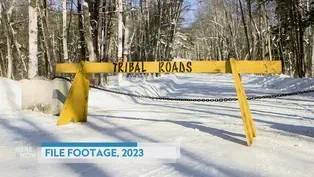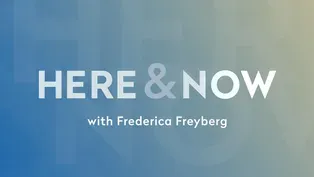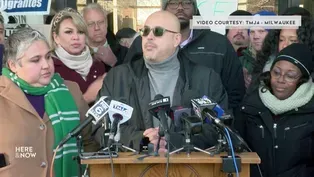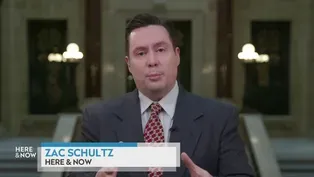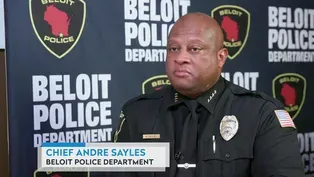Here and Now
Philip Rocco on Shared Revenue Shortfall Issues in Wisconsin
Clip: Season 2300 Episode 2327 | 5m 37sVideo has Closed Captions
Philip Rocco on Wisconsin's 2023 shared revenue deal to boost local government funding.
Marquette University political science professor Philip Rocco discusses impacts of Wisconsin's 2023 shared revenue deal to boost local government funding as Waukesha faces a $5 million budget gap.
Problems with Closed Captions? Closed Captioning Feedback
Problems with Closed Captions? Closed Captioning Feedback
Here and Now is a local public television program presented by PBS Wisconsin
Here and Now
Philip Rocco on Shared Revenue Shortfall Issues in Wisconsin
Clip: Season 2300 Episode 2327 | 5m 37sVideo has Closed Captions
Marquette University political science professor Philip Rocco discusses impacts of Wisconsin's 2023 shared revenue deal to boost local government funding as Waukesha faces a $5 million budget gap.
Problems with Closed Captions? Closed Captioning Feedback
How to Watch Here and Now
Here and Now is available to stream on pbs.org and the free PBS App, available on iPhone, Apple TV, Android TV, Android smartphones, Amazon Fire TV, Amazon Fire Tablet, Roku, Samsung Smart TV, and Vizio.
Providing Support for PBS.org
Learn Moreabout PBS online sponsorshiplawsuit to settle the dispute is pending.
Wisconsin is sitting on a $4 billion surplus.
Some counties would like a bigger piece of that pie through the state's shared revenue back in 2023, a much heralded bipartisan shared revenue plan for local governments was passed, allowing Milwaukee to raise its sales tax to shore up services, while at the same time boosting state revenue.
Coming to locals across the state.
But now the richest county in the state, Waukesha County, is looking at a $5 million budget shortfall in 2025 and is beseeching the state to give more.
Marquette University Professor of political Science Philip Rocco is an expert in all of this, and he joins us now.
Thanks very much for being here.
>> Good to be with you.
>> So I thought that this 2023 shared revenue plan was a great deal for local governments.
What happened?
>> Well, it was a big deal, right?
It was the single largest increase in shared revenue that local governments had received since the early 2000.
But the reality is that compared to what cities, towns, villages and counties had lost since the early 2000.
Because the formula wasn't updated for inflation and because there were several big cuts to shared revenue.
It's really a fraction of what local governments and county governments had lost in inflation adjusted terms since the early 2000.
And at the same time, inflation has sort of proceeded a pace that raises the cost of services for local governments.
And so while it was by no means a small thing, there are still challenges that local governments around the state are facing.
>> Is it striking that a county like Waukesha County, regarded as the wealthiest in Wisconsin, would be in this position?
>> No, I don't think it's particularly surprising, in part because the shared revenue formula is not necessarily designed to advantage counties like Waukesha receives one of the largest or lowest shares in per capita aid among counties in the state.
At the same time, the pressures that are on counties and municipalities around the state are really pretty constant, regardless of their wealth.
So, for example, there are inflation pressures which raise the cost of doing things like sidewalk repair and street repair.
But at the same time, the property tax levy limit that the state sets has not been adjusted to sort of take account of those inflationary pressures.
And that really puts counties and municipalities in a squeeze position.
>> Is it your expectation that the state would do something around those levy limits?
>> I think that's possible.
I think that that is, if you talk to local officials, both in counties, municipalities, that's one of their key agenda items.
And so I would expect to see movement on that before.
I would expect to see movement on sort of increasing formula funding under act 12.
>> So other counties raised their state sales tax to fund needs.
And Waukesha wanted to.
What happened with that?
>> I think that was one of the things that helps explain the shortfall.
And maybe why Waukesha is in this position, which is like a lot of other counties.
There was a push to increase the sales tax by 0.5%, but there was, unlike in Milwaukee, where the business community was in favor of that measure, both for the county and the city.
In Waukesha County, the business community, the Chamber of Commerce really opposed that.
And so the legislation was pulled sort of at the last minute to reevaluate it.
particular so strapped?
>> Counties are important because they really pulled double duty in Wisconsin government.
They're both local governments in their own right that offer things on a discretionary basis to their residents.
But at the same time, they are service providers and agencies of the state.
And so they have a lot of responsibilities that they can't easily get out of.
And a lot of their budget is sort of spoken for by the state.
And so that especially in in conditions where there's sort of inflationary pressure that can put an additional vice grip, I think, on county finances.
And so when you look at what counties are asking for in the 2025 to 27 budget, what they're asking for is not additional shared revenue of the sort that that they got under act 12, but the sorts of special revenue programs or aid programs that help them to support the services that they provide on behalf of the state.
>> What are some examples of those services that they provide on behalf of the state that are different?
>> So there's all sorts of mental health services that counties are the sort of main provider of.
If you think about the state court system that really operates through counties, jails as well, are county functions.
But mandated in a way by the state.
And there's really a host of additional kind of mandatory programs that counties administer.
>> All right.
Professor Phillip Rocco, thanks very much.
We'll be looking at that next state be looking at that next state
Federal Judge Orders Lac du Flambeau Roads to Remain Open
Video has Closed Captions
A federal judge said Lac du Flambeau roads must remain open while a ruling is pending. (1m 1s)
Here & Now opening for January 17, 2025
Video has Closed Captions
The introduction to the January 17, 2025 episode of Here & Now. (1m 1s)
Local Officials Voice Concern Over Mass Deportation Plans
Video has Closed Captions
José Pérez and Ismael Ozanne speak to local concerns over mass deportation plans. (1m 43s)
Seasonal Respiratory Viruses Are Peaking for Young Children
Video has Closed Captions
Seasonal respiratory viruses are spreading across Wisconsin as authorities monitor H5N1. (2m 1s)
Zac Schultz on Wisconsin's Separation of Powers Lawsuit
Video has Closed Captions
Zac Schultz on a Wisconsin Supreme Court case on administrative rules in state government. (6m 29s)
Chief Andre Sayles on Beloit Police and Immigration Status
Video has Closed Captions
Andre Sayles on policing practices toward undocumented immigrants in the city of Beloit. (11m 37s)
Providing Support for PBS.org
Learn Moreabout PBS online sponsorshipHere and Now is a local public television program presented by PBS Wisconsin
